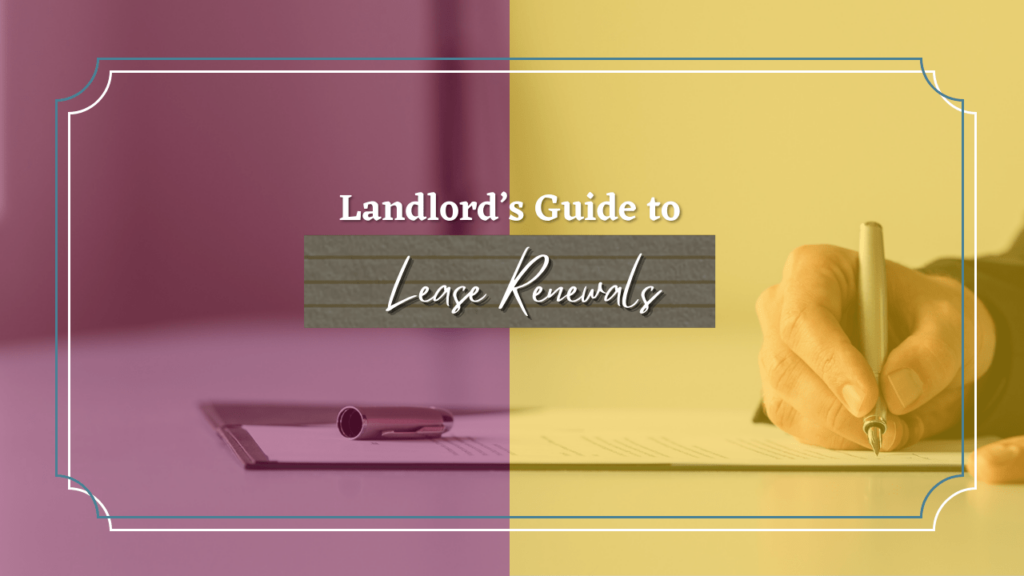
If you’re not prepared, lease renewals can sneak up on you.
The starting point for any lease renewal process is a careful review of the terms of your current rental agreement. There’s a window that your tenant will have to provide their notice to vacate if they’re not planning to renew. Get in touch a few months ahead of the end date so you can establish whether your resident will be staying or leaving.
Retaining residents is important to most property owners. You want to avoid the vacancy and turnover costs that come with losing a tenant. Consider this when you’re deciding how to negotiate a new lease agreement. Your residents will stay in place if they’ve had a good rental experience.
Our experience managing rental properties in Las Vegas has given us a lot of insight into how to effectively work through the renewal process. We have high rates of tenant retention and excellent relationships in place with our residents.
Here’s our guide for landlords around lease renewals.
Decide if You Want to Renew your Lease Agreement
Before you get in touch with your tenant about negotiating the renewal, you have to make sure that you do want to continue renting out your home to your existing resident. If you have decided to sell the property or move into it yourself, you’ll instead want to provide your resident with the required notice that they need to vacate.
If you don’t have other plans for the property and your tenants have contributed to a positive rental experience, a renewal offer is likely in your best interests. Retaining tenants is good for your bottom line. You’ll save money on vacancy and turnover costs.
However, not all tenants are easy. If you would prefer to end the relationship rather than extend it, this is the time to do that. Here are some considerations before you offer a lease renewal:
- Has the tenant paid rent on time over the course of the lease period? Did they catch up quickly if rent was late?
- Has the tenant maintained the property? Is it clean and in good condition? Do they make maintenance requests promptly?
- Are tenants easy to communicate with?
Those are the considerations most landlords weigh before deciding to renew. What about your residents? While making a lease renewal decision, your Las Vegas tenants will likely consider:
- Whether they have had a positive rental experience over the last year.
- Whether the rental value matches the Las Vegas rental market.
- If maintenance and repair needs were responded to promptly.
- Whether the landlord and/or property manager was responsive and transparent.
Once you know you’re going to offer a lease renewal to your current residents, you’ll want to get in touch.
Review Your Existing Lease Agreement
What does your current lease agreement say about the end of the lease term? In some cases, the tenancy immediately switches to a month-to-month rental agreement. Or, the lease will require a renewal or for the tenants to vacate.
Your existing lease should indicate how much notice a tenant needs to give before vacating or renewing the lease. Pay attention to that date, and then work backwards as you’re planning your process.
We recommend at least a 30 day requirement. This means that if a tenant plans to move out, he or she will give you a month’s notice, which will allow you time to make your plans. Send a letter to your tenants ahead of that 30-day window.
More and more Las Vegas rental properties are in an HOA or community associations. If you’re renting out a home that is in an association, you’ll need to find out if there is any additional renewal paperwork that’s required by the association.
If you’re working with a Las Vegas property manager, most of these steps will be taken care of for you. But if you’re an independent landlord, make sure you have a solid timeline in place so you’re not rushing to get a new lease signed days before the existing lease expires.
Offering Las Vegas Residents a Lease Renewal
When it’s time to contact your tenants about the lease renewal offer, put your communication in writing. Even if you talk casually with your tenants over phone or text, you’ll want something that documents your terms.
This initial contact regarding lease renewal should occur at least 60 days in advance of the lease agreement’s end date. That’s when your tenants would be required to give you notice of their plans to move. It’s an even better idea to schedule your renewal contact for 75 to 90 days before the end of the lease.
Send a letter or an email about the approaching lease end date, and give them some options to consider. Those options will depend on what you permit in your current lease and what you’re willing to work with. Some landlords are fine with month to month tenancies. Others take an all-or-nothing approach and want a renewal or a vacancy. Ask tenants if they intend to:
- Sign a new 12-month lease to continue renting the property.
- Leave the agreement to a month to month contract instead of signing a lease agreement (if this is an accommodation you’re willing to make).
- Provide notice of their intent to vacate.
There are benefits and consequences to each of those options, and you’ll want to be sure those are communicated to the tenant.
For example, signing a new one-year lease agreement will result in a better renewal rate. If they’d prefer to go month to month or to stay in the property for an extra three months or six months only, you might be willing to consider that. However, you’re within your rights to ask a higher rental price in exchange for that flexibility.
Moving out comes with its own pricing risks because tenants will generally find that rental values have increased over the course of the year that they’ve been renting your property. Most residents will do the math and realize it may cost more to find a new rental home in Las Vegas.
Encourage your tenants to get in touch with you as soon as possible when they’re ready to provide their decision. The more advance notice you have, the better you’ll be able to negotiate the rent and the terms of the lease renewal with your residents.
Some renters will simply agree to the lease renewal without comment. Others will immediately let you know that they are planning to move out.
Sometimes, tenants will want to talk with you about the renewal options. They may want to negotiate.
This is not a bad thing, and we always encourage owners to keep the lines of communication open. Perhaps they don’t want to renew unless their carpets are cleaned or an appliance is replaced, for example. Be willing to hear their requests and consider negotiating.
How to Raise the Rent When You Renew a Las Vegas Lease
 Tenants are educated about the market and they likely have rented homes before. They’re going to expect that their rent will go up when it’s time to sign a lease renewal. While some of them might complain about it or feel victimized by a higher rental rate, most of them understand that this is the way lease renewals work.
Tenants are educated about the market and they likely have rented homes before. They’re going to expect that their rent will go up when it’s time to sign a lease renewal. While some of them might complain about it or feel victimized by a higher rental rate, most of them understand that this is the way lease renewals work.
You should feel free to implement a rental increase unless the market has shifted in a way that rents in Las Vegas are much lower than they were when your tenants initially signed the lease.
But, keep that increase reasonable.
You don’t want to chase away good tenants with a ridiculously high increase in rent. Spend some time researching the Las Vegas rental market but remember those online sources are a great starting point. Talk to local property managers who can share their experience, have access to the necessary data and documentation that supports your decision to raise the rent. You don’t want to do a quick internet search and then haphazardly decide how much you’re going to increase your rent.
Always be open to talking with the tenant about why rent is increasing. Show them your data. Explain where rents are right now, and what they’d be paying if they moved into a similar property.
There’s also a consideration for tenant retention when raising the rent. Good tenants are valuable assets, and you want to keep them in place. The best thing you can do is to establish where your rent should be according to the market, and then keep your renewal rate just a bit lower. This will give your tenants the incentive they need to stay where they are and renew their lease.
We can help you establish the right rent at renewal time. We can also help you negotiate other lease terms with your tenants. This is part of how we serve our property management clients, and we’re always happy to be a resource.
If you’re unsure about how to handle your lease renewal or you need some help with the management of your Las Vegas investment property, we’d love to help you. Please contact us at New West Property Management. Our team expertly manages residential rental homes in Las Vegas and throughout Clark County, including Henderson and North Las Vegas.
